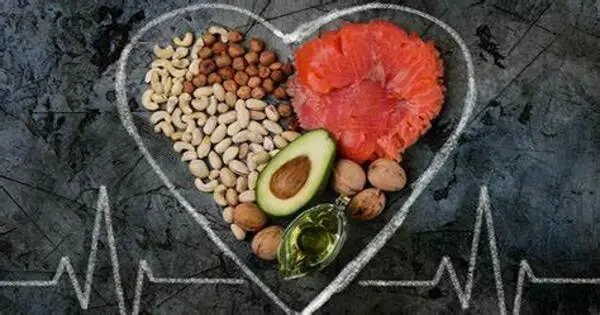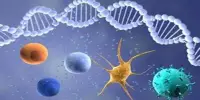A new study to help you stick to your New Year’s resolutions: it shows that high-fat diets have a detrimental influence on genes connected to not only obesity, colon cancer, and irritable bowel syndrome, but also the immune system and brain function.
A UC Riverside study to inspire your New Year’s resolutions: it shows that high-fat diets impact genes connected to not only obesity, colon cancer, and irritable bowel syndrome, but also the immune system, brain function, and maybe COVID-19 risk.
While other studies have looked into the impacts of a high-fat diet, the scale of this one is exceptional. Over the course of 24 weeks, UCR researchers fed mice three different diets containing at least 40% fat calories. The researchers then examined not only the microbiome, but also genetic changes in all four regions of the colon.
One group of mice was fed a meal high in saturated fat from coconut oil, another in monounsaturated, modified soybean oil, and a third in polyunsaturated, unmodified soybean oil. All three groups experienced worrying alterations in gene expression, the process by which genetic information is converted into a functional product such as a protein, when compared to a low-fat control diet.
We saw pattern recognition genes, ones that recognize infectious bacteria, take a hit. We saw cytokine signaling genes take a hit, which help the body control inflammation. So, it’s a double whammy. These diets impair immune system genes in the host, and they also create an environment in which harmful gut bacteria can thrive.
Frances Sladek
“Word on the street is that plant-based diets are better for you, and in many cases that’s true. However, a diet high in fat, even from a plant, is one case where it’s just not true,” said Frances Sladek, a UCR cell biology professor and senior author of the new study.
A new Scientific Reports paper about the study documents the many impacts of high-fat diets. Some of the intestinal changes did not surprise the researchers, such as major changes in genes related to fat metabolism and the composition of gut bacteria. For example, they observed an increase in pathogenic E. coli and a suppression of Bacteroides, which helps protect the body against pathogens.
Other observations were more surprising, such as changes in genes regulating susceptibility to infectious diseases. “We saw pattern recognition genes, ones that recognize infectious bacteria, take a hit. We saw cytokine signaling genes take a hit, which help the body control inflammation,” Sladek said. ‘So, it’s a double whammy. These diets impair immune system genes in the host, and they also create an environment in which harmful gut bacteria can thrive.”
The team’s previous work with soybean oil documents its link to obesity and diabetes, both major risk factors for COVID. This paper now shows that all three high-fat diets increase the expression of ACE2 and other host proteins that are used by COVID spike proteins to enter the body.
Additionally, the team observed that high-fat food increased signs of stem cells in the colon. “You’d think that would be a good thing, but actually they can be precursors to cancer,” Sladek said.

In terms of gene expression impacts, coconut oil had the most modifications, followed by unmodified soybean oil. Differences between the two soybean oils show that polyunsaturated fatty acids in unmodified soybean oil, specifically linoleic acid, have a function in gene expression regulation.
In this study, negative changes to the microbiota were more pronounced in mice fed a soybean oil diet. This was not surprising given that the same research team has previously identified numerous harmful health impacts of excessive soybean oil consumption.
The researchers discovered in 2015 that soybean oil causes obesity, diabetes, insulin resistance, and fatty liver in mice. Researchers demonstrated in 2020 that the oil could also influence genes in the brain associated with illnesses such as autism, Alzheimer’s disease, anxiety, and depression.
Interestingly, in their current work they also found the expression of several neurotransmitter genes were changed by the high fat diets, reinforcing the notion of a gut-brain axis that can be impacted by diet.
The researchers have noted that these findings only apply to soybean oil, and not to other soy products, tofu, or soybeans themselves. “There are some really good things about soybeans. But too much of that oil is just not good for you,” said UCR microbiologist Poonamjot Deol, who was co-first author of the current study along with UCR postdoctoral researcher Jose Martinez-Lomeli.
Furthermore, the research were conducted on mice, and mouse studies do not necessarily provide the same outcomes in humans. Humans and mice, on the other hand, share 97.5% of their functional DNA. As a result, the findings are troubling, given that soybean oil is the most regularly consumed oil in the United States and is growing used in other nations such as Brazil, China, and India.
According to some estimates, Americans consume approximately 40% of their calories from fat, which is similar to what the mice in this study were fed. “Some fat, perhaps 10 to 15%, is required in the diet. Most people, at least in this country, get at least three times what they need,” Deol explained.
Readers should not be concerned over a single meal. The observed modifications are the result of a long-term high-fat habit. Remember that the mice were fed these meals for a period of 24 weeks. “In human terms, that is equivalent to beginning in childhood and continuing until middle age.” These mice did not eat for one night of excess. “It’s more like a lifetime of food,” Deol explained.
Nonetheless, the researchers hope that the study may prompt people to reconsider their eating habits.
“‘Oh, I’ll just exercise more and be fine,’ some people assume. However, eating this way on a regular basis may have an effect on your immune system and how your brain functions,” Deol said. “You may not be able to just exercise away these effects.”
















